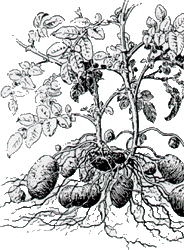|
When you eat French fries, you probably
don't think
anything about them other than that they look good, smell good
and taste good. When Fatimah Jackson eats French fries, she enjoys
them, but she also thinks about the chemicals that potatoes naturally
contain, and wonders what effect they may be having on her body.
"Plants are storehouses of chemical weapons," says Fatimah, a
biologist and anthropologist at the University of Maryland at
College Park who studies how plants and people affect one another.
She's not talking about chemicals that are sometimes sprayed onto
plants. The ones she studies are "just the God-given chemicals
in the plants. One thing about plants is that they can't run very
fast," Fatimah says with a wide smile. "They can't even run at
all. So what they have developed are chemicals to draw insects
and humans and animals that would help them survive toward them
or to keep other animals away from them. So, the chemicals that
keep you away are called repellents and the chemicals that draw
you toward the plant are called attractants."

Before fruits and vegetables ripen, they are often green and
bitter. These are signals to stay away from them. Not only will
they taste bad, at that stage, the fruits or vegetables contain
chemicals called repellents that are harmful to eat. Repellents
are nature's way of getting you to leave the plant alone until
it is ready to be eaten.
And, Fatimah points out, the appearance and the taste also protect
the plant until it is ready to have you assist in its survival.
"It needs to be picked in order to disperse its seeds, but it
doesn't want to have its seeds dispersed before they are really
mature. So, the fruit on the outside, the soft flesh, is really
a mechanism to get the seed scattered all over the place to produce
more trees or bushes to produce more fruit," she explains.
(excerpted from the biography written by Mary Knudson, and the
entire biography is available on the African Plant Explorer CD-ROM.)
|




